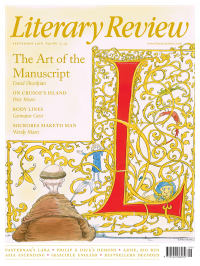Nakul Krishna
Slave Revolt
Selection Day
By Aravind Adiga
Picador 330pp £16.99
Three novels and a collection of short stories on, it is beginning to be clear that Aravind Adiga has claimed a piece of literary terrain for his own and devised a style to go with it. That terrain is urban India; his characters are the working and lower-middle classes – on the make, fired by ressentiment and far from idle. The ancestral village is for many of them a living memory. Adiga’s city, temptress and abuser, maintains a permanent assault on the individual’s integrity.
Coexisting with Adiga’s tough-mindedness is an ethical mission, thrilling, dangerous and often futile: that of trying to individuate yourself in a world that would rather you didn’t bother. The go-getting subaltern narrator of his first, Booker Prize-winning novel, The White Tiger (2008), was capable of deceit, betrayal and

Sign Up to our newsletter
Receive free articles, highlights from the archive, news, details of prizes, and much more.@Lit_Review
Follow Literary Review on Twitter
Twitter Feed
It wasn’t until 1825 that Pepys’s diary became available for the first time. How it was eventually decrypted and published is a story of subterfuge and duplicity.
Kate Loveman tells the tale.
Kate Loveman - Publishing Pepys
Kate Loveman: Publishing Pepys
literaryreview.co.uk
Arthur Christopher Benson was a pillar of the Edwardian establishment. He was supremely well connected. As his newly published diaries reveal, he was also riotously indiscreet.
Piers Brendon compares Benson’s journals to others from the 20th century.
Piers Brendon - Land of Dopes & Tories
Piers Brendon: Land of Dopes & Tories - The Benson Diaries: Selections from the Diary of Arthur Christopher Benson by Eamon Duffy & Ronald Hyam (edd)
literaryreview.co.uk
Of the siblings Gwen and Augustus John, it is Augustus who has commanded most attention from collectors and connoisseurs.
Was he really the finer artist, asks Tanya Harrod, or is it time Gwen emerged from her brother’s shadow?
Tanya Harrod - Cut from the Same Canvas
Tanya Harrod: Cut from the Same Canvas - Artists, Siblings, Visionaries: The Lives and Loves of Gwen and Augustus John by Judith Mackrell
literaryreview.co.uk